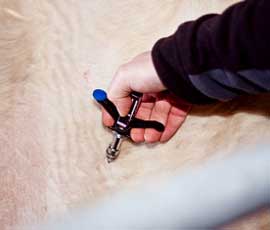Bovine TB resistance gene found in cattle

Farmers may be able to select cattle with some level of resistance to bovine TB, as researchers find a genetic link.
Work at the Roslin Institute at the University of Edinburgh found some degree of bovine TB resistance is inherited, with genetic markers associated with resistance also identified.
Liz Glass who led the research said the results mean it could be possible to selectively breed cows which are more resistant to the disease.
“Over the last two years it has become clear there is variation in cattle response to TB and that there is a substantial genetic component,” she said.
The research involved more than 1,000 Holstein Friesian cattle in Northern Ireland.
The ‘control’ group were exposed to the same environment as the ‘cases’ yet the ‘control’ group tested negative to the skin test whereas the ‘cases’ tested positive to TB in both the skin test and the lesion test.
All animals where from the same/similar herds and were of the same age and breed.
When genetic information from the two groups were compared, Prof Glass found cattle that contained certain markers were more than double at risk of contracting bovine TB.
DairyCo are now using some of the quantitative data from the BBSRC-funded study to see whether they could add in TB resistance to the existing breeding indexes.
Prof Glass said depending on the pilot trial, farmers could have access to breeding information in the next two to three years.
However, she added that this wasn’t a complete solution to controlling the disease.
“We see this as an additional tool to help control bovine TB and reduce the force of infection.
“This is a step along the way because we need something otherwise within the next decade, in England alone, the disease will have cost the industry £1b.”
